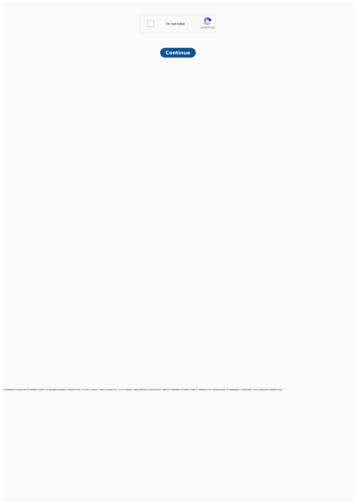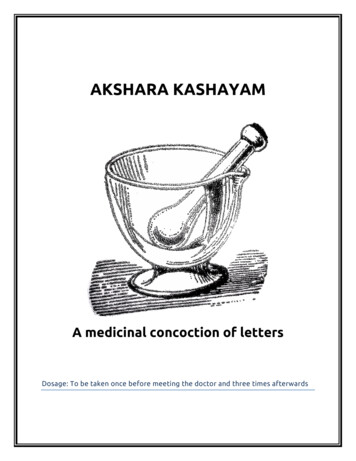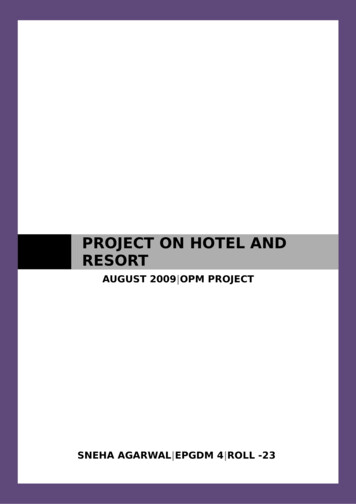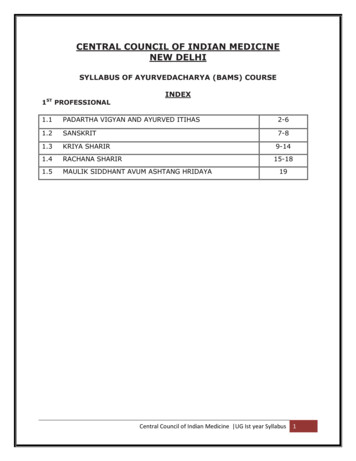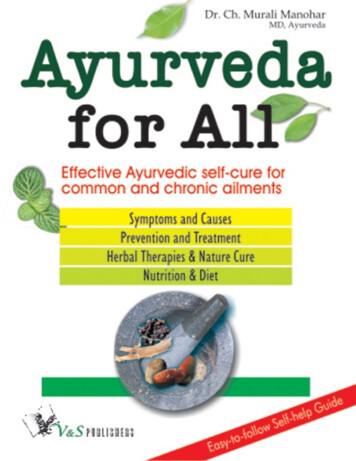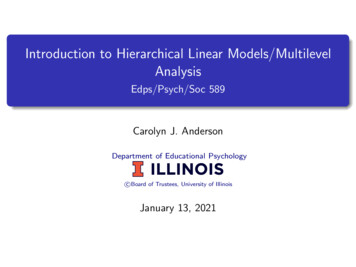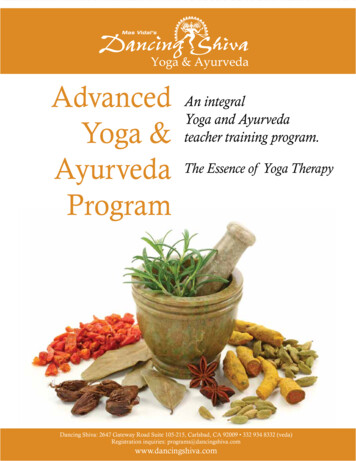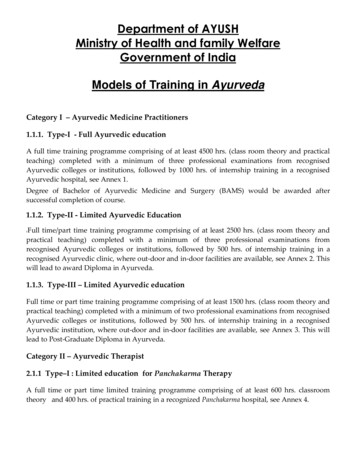
Transcription
Department of AYUSHMinistry of Health and family WelfareGovernment of IndiaModels of Training in AyurvedaCategory I – Ayurvedic Medicine Practitioners1.1.1. Type-I - Full Ayurvedic educationA full time training programme comprising of at least 4500 hrs. (class room theory and practicalteaching) completed with a minimum of three professional examinations from recognisedAyurvedic colleges or institutions, followed by 1000 hrs. of internship training in a recognisedAyurvedic hospital, see Annex 1.Degree of Bachelor of Ayurvedic Medicine and Surgery (BAMS) would be awarded aftersuccessful completion of course.1.1.2. Type-II - Limited Ayurvedic EducationFull time/part time training programme comprising of at least 2500 hrs. (class room theory andpractical teaching) completed with a minimum of three professional examinations fromrecognised Ayurvedic colleges or institutions, followed by 500 hrs. of internship training in arecognised Ayurvedic clinic, where out-door and in-door facilities are available, see Annex 2. Thiswill lead to award Diploma in Ayurveda.F1.1.3. Type-III – Limited Ayurvedic educationFull time or part time training programme comprising of at least 1500 hrs. (class room theory andpractical teaching) completed with a minimum of two professional examinations from recognisedAyurvedic colleges or institutions, followed by 500 hrs. of internship training in a recognisedAyurvedic institution, where out-door and in-door facilities are available, see Annex 3. This willlead to Post-Graduate Diploma in Ayurveda.Category II – Ayurvedic Therapist2.1.1 Type–I : Limited education for Panchakarma TherapyA full time or part time limited training programme comprising of at least 600 hrs. classroomtheory and 400 hrs. of practical training in a recognized Panchakarma hospital, see Annex 4.
2.1.2 Type – II – Limited education for Ayurvedic DieteticsA full time or part time limited training programme comprising of at least 600 hrs. classroomtheory and 400 hrs. of practical training in a recognized Ayurvedic hospital, see Annex 5.2.1.3. Type – III – Limited education for Ayurveda PharmacyA full time or part time training program comprising of at least 600 hrs. class room theory and400 hours practical training and clinical dispensing in recognised Ayurvedic Institute, see Annex6.2.1.4. Type – IV – Limited Education on Ayurveda for Self health CareA full time or part time training programme comprising of at least 200 hrs. Class room theory andpractical teaching in recognised Ayurvedic colleges or institutions. This refers to people, whowish to learn Ayurveda for self health care.
Category –I Full Ayurvedic Education Type-I(Degree of Bachelor of Ayurvedic Medicine andSurgery - BAMS)This refers to the person, who wish to undertake a full time training programme to become a fullfledged Ayurvedic practitioner.ObjectiveThe sole objective of the training is to make provisions to provide factual information on holisticapproach of Ayurveda to all such persons, who wish to learn and practice Ayurveda for the wellbeing of the society.Entrance requirementCompleted senior secondary or Pre University or equivalent education recognised for admissionto medical graduate courses in respective countries.Basic trainingAt least 4500 hrs. (Class room theory and practical teaching) completed with a minimum of threeprofessional examinations from recognised Ayurvedic colleges or institutions, followed by 1000hrs. of internship training in a recognised Ayurvedic hospital.Core syllabusCore syllabus in Ayurveda is as designed in Annex 1.
Annex 1Category I (Type – I): A specimen for full-time professional course with number of hours.DivisionsSubjectTheoryPracticalTotalFirst Professional History of Ayurveda(one and half year) Sanskrit and SamhitaPadartha Vigyana (Ayurvedicphilosophy)Rachna Sharira (anatomy)Kriya Sharira ondRasa Shastra avam Bhaisajya KalpanaProfessional (one (Pharmaceuticals of Ayurveda)and half year)Dravyaguna (Materia Medica ofAyurveda)250100350250150400Agadtantra, VyavaharAyurveda and VidhiVaidyaka (Toxicology and Jurisprudence)Nidan/Vikriti Vigyana (Pathology) /NadiParkisa (Pulse diagnosis)Svasthavritta & Yoga (Personal and socialhygiene including dietetics)Charaka Samhita (A classical text ofAyurveda)Final Professional KayaChikitsa(GeneralMedicine(one and half year) including Panchakarma, Rasayana andVajikarana)Shalya tantra (General surgery andparasurgical techniques)Shalakya tantra (ENT, Eye and mStri(Gynaecology and Obstetrics)Kaumara bhritya (Paediatrics)Medical EthicsHealth RegulationsYogaDissertationTotalSupervised 7575501252020-2020505010045001000
Category –I Limited Ayurvedic Education Type-II(Diploma in Ayurveda)A full time/part time training programme comprising of at least 2500 hrs. (class room theory andpractical teaching) completed with a minimum of three professional examinations fromrecognised Ayurvedic colleges or institutions, followed by 500 hrs. of internship training in arecognised Ayurvedic hospital/clinic,.1. ObjectiveThe aim of limited Ayurvedic education is to establish, fulfil the requirements in all thosecountries where government regulations have been enacted. On the basis of this education,Ayurvedic practice would be as primary – contact health care providers, either independently oras a member of health care system.2. Entrance requirementsCompleted senior secondary or pre-university or equivalent education recognised for admissionto medical graduate courses in respective countries.3. Basic trainingThis programme may be full time or part time with at least 2500 hrs. training (class room theoryand practical teaching) covering all Ayurveda subjects 500 hrs. supervised clinical training ofinternship training in a recognised Ayurvedic hospital/ clinic, with at least three examinationsfrom a recognized Ayurvedic institution/university.4. Core syllabusCore syllabus in Ayurveda is designed to ensure that after completion of the training a person will developskill to practice Ayurveda, see Annex 2.
Annex 2Category I (Type II): A specimen for typical full time/part time accredited training programme(with number of hours) to become limited Ayurvedic practitioner.DivisionsComponents offundamentalprinciples nents l25100100300Kriya Sharira ( a(Pharmaceuticals in Ayurveda)Dravyaguna (Materia Medica in 400150550Shalya tantra (General surgery and parasurgicaltechniques)Shalakya tantra (ENT, Eye and Dentistry)351550351550Prasuti tantra avam Stri roga (Gynaecology andObstetrics)Kaumara bhritya (Paediatrics)401050401050Medical Ethics & Health Regulationsrelated to Traditional Medicine25-25History of AyurvedaSanskrit & Ayurveda TerminologyPadartha Vigyana (Ayurvedic philosophy)Rachna Sharira (anatomy)Agadtantra, (Toxicology)Clinicalcomponents ofAyurvedaVikriti Vijnana (Pathology)Svasthavritta & Yoga (Personal and socialhygiene including dietetics)Kaya Chikitsa (General Medicine includingPanchakarma, Rasayana and Vajikarana)DissertationTotalClinical training500 hours.1740 7602500500 hours.
Category-I Limited Ayurvedic EducationType-III (Post-Graduate Diploma in Ayurveda)This programme is for licensed practitioners in allopathic medicine/CAM/ Traditional Medicine with agraduate degree. This programme is intended to provide supplementary education to enable them to becomelicensed Ayurveda practitioners. A Post graduate diploma in Ayurveda would be awarded after successfulcompletion of course.1.1. ObjectiveThe aim of full Ayurvedic education is to establish, fulfil the requirements in all those countrieswhere government regulations have been enacted. On the basis of this education, Ayurvedicpractice would be as primary – contact health care providers, either independently or as amember of health care system at the community health center or in hospitals.1.2. Entrance requirementsAn applicant should be a licensed practitioner in allopathic medicine or Traditional Medicine witha graduate degree.1.3. Basic trainingThis programme may be full time or part time with at least 1500 hrs. training (class room theoryand practical teaching) covering all Ayurveda subjects 500 hrs. supervised clinical training ofinternship training in a recognised Ayurvedic hospital,with at least two examinations from arecognized Ayurvedic institution/university, and depending on their background, some westernmedicine subjects1.4. Core syllabusCore syllabus in Ayurveda for Allopathic/Traditional Medicine graduates, is designed to ensurethat after completion of the training a person will develop skill to practice Ayurveda. (Annex 3).
Annex 3Category I (Type III): A specimen for typical full time/part time accredited training programme(with number of hours) to become limited Ayurvedic practitioner.DivisionsComponents offundamentalprinciples nents ofAyurvedaClinicalcomponents maceuticals in Ayurveda)Dravyaguna (Materia Medica in Ayurveda)Agadtantra, (Toxicology)Vikriti Vijnana (Pathology)Svasthavritta & Yoga (Personal and socialhygiene including dietetics)A brief introduction to Charaka Samhita (Aclassical text of Ayurveda)7045115806514530806020404050120100Kaya Chikitsa (General Medicine includingPanchakarma, Rasayana and Vajikarana)Shalya tantra (General surgery and parasurgicaltechniques)Shalakya tantra (ENT, Eye and Dentistry)Prasuti tantra avam Stri roga (Gynaecology andObstetrics)Kaumara bhritya istory of AyurvedaSanskritPadartha Vigyana (Ayurvedic philosophy)Rachna Sharira (Ayurveda anatomy)Kriya Sharira (physiology)Medical Ethics & Health Regulationsrelated to Traditional MedicineDissertationTotalSupervised clinical training30301500 hours. (18 Months)500 hours. (6 Months)
Category – II: Ayurvedic therapist1. Type – I : Limited Ayurvedic Education inPanchakarma TherapyThis training programme is for the persons to become a licenced Panchakarma Therapist.1.1 ObjectiveThe objective of such a specialized therapy is to understand fundamental principles ofpanchakarma therapy and its application in healthy state of life to maintain health of an individualperson and necessary knowledge and skill to apply panchakarma therapy convincingly andscientifically for the alleviation of disorders.1.2Entrance requirementCompleted senior secondary or pre university or equivalent qualification recognised foradmission to medical graduate courses in respective countries.1.3Basic trainingAt least 1000 hours (class room theory of 600 hours and practical teaching of 400 hours)completed with a minimum of two examinations from recognised Ayurvedic colleges orinstitutions.1.4 Core syllabusCore syllabus is planned in a way to make an individual to possess skillful knowledge of panchakarmaprocedures and after completion of the training develop enough confidence to carry out panchakarmatherapy, see Annex
Annex 4Category II (Type I): A specimen for typical full time/part time accredited training programmewith number of hours to become Panchakarma tharapist.TheoryHoursPracticalHoursTotalBasic theory of AyurvedaPhilosophy of Ayurveda (Padarthavigyan)Principles of therapeutics in AyurvedaIntroduction to Rachana and Kriya ShariraDietary and drug substances in Ayurveda Conceptof health and disorders in Ayurveda aIntroduction to PanchakarmaBasic concepts of PanchakarmaImportance of Panchakarma therapySnehana karma, its indications andcontraindicationsComplication of excessive snehana and itsmanagementSvedana karma, its indications andcontraindicationsComplication of excessive Svedana and itsmanagementVamana karma, its indications andcontraindicationsVirechana karma, its indications andcontraindicationsAnuvasana karma, its indications andcontraindicationsAsthapana karma, its indications andcontraindicationsSirovirechana karma, its indications andcontraindicationsRaktamokshana, its indications andcontraindicationsShirodhara, Shirovasti, Pindasveda, Annalepa,Kayaseka and Shirolepa.Samsarjana karma (post-operative management)Preparation of diet articles and materials used inpanchakarma 5101020201030155065102010102030Supervised training400 hours.Subject600 hours
Category II - Ayurvedic therapistType – II: Limited Ayurvedic Education in AyurvedicDieteticsThis training programme is for the persons who wish to become a licensed Ayurvedic Dietician.1.1.ObjectiveThe objective of such a specialized therapy is to acquaint comprehensive understanding ofAyurvedic dietetics and develop propensity to understand the importance of diet/dietarysubstances in healthy and diseased persons.1.2.Entrance requirementCompleted senior secondary or pre university or equivalent education recognised for admission to medicalgraduate courses in respective countries.1.3.Basic trainingAt least 1000 hours (class room theory of 600 hours and practical teaching of 400 hours) completedwith a minimum of two examinations from recognised Ayurvedic colleges or institutions.1.4.Core syllabusCore syllabus is planned in a way to make an individual to possess skillful knowledge ofAyurvedic pharmaceutics and after completion of the training develop enough confidence inpreparation of Ayurvedic simple dosage forms as well as in dispensing the Ayurvedic medicinesin Ayurvedic hospitals. see Annex 5.
Annex 5Category II (Type II): A specimen for typical full time/part time accredited training programmewith number of hours to become Ayurvedic dietician.SubjectBasic principles of ayurvedaPhilosophy of Ayurveda (Padarthavigyan)Introduction of rachana and kriya shariraSvasthavritta and yogaConcept of ahara and its importanceAyushyakara and urjaskara aharaImportance of ahara in health and disordersAahara dravya, their properties and classificationHita avam ahita ahara based on doshika prakritiAhara avam jatharagniRitucharya avam aharaDinacharya avam aharaBest food articles and their actionUse of shadrasa in ahara for healthTypes of food and drinksCereals and pulses and their propertiesVegetables, fruit and salads and their propertiesFermented liquorsTypes of water and their importance in aharaMilk and milk products in health and diseaseSneha varga (edible fats and oils)Meat, fish and poultry productsTypes of honey and medicinal usesKritanna varga (Various dietary forms - Recipes)Adjuvant foodAnupana in accordance with vata, pitta 05025502020302020510105101051515105105kapha 10Incompatible Diet (Viruddha ahara)Satmya and asatmya aharaPathya and apathya ahara in various disease conditions– jvara, atisara, kamala, pandu, raktapitta, unmada,apasmara, prameha, madhumeha, Amavata, Sandhi gataVata etc. (Minimum 50 disease conditions)Importance of Diet (ahara)in yogic practicesTotalSupervised training
Category II - Ayurvedic therapistType – III: Limited Ayurvedic Education in AyurvedicMedicine Pharmacists/ dispensersThis training programme is for the persons who wish to become a licensed Ayurvedic MedicinePharmacists/ dispensers.1.1.ObjectiveThe objective of such a specialized therapy is to acquaint comprehensive understanding ofAyurvedic pharmaceutics and develop propensity in preparation of Ayurvedic simple dosageforms as well as in dispensing Ayurvedic drugs1.2.Entrance requirementCompleted senior secondary or pre university or equivalent education recognised for admission tomedical graduate courses in respective countries.1.3.Basic trainingProgramme for persons with level II training will consist of at least 1000 hours (class roomtheory of 600 hours and practical teaching of 400 hours) of student-teacher contact consisting oftheory and laboratory practice with a minimum of two examinations from recognised Ayurvediccolleges or institutions. This will also include 200 hours of clinical dispensing and communitywork under supervision of qualified dispensers or pharmacists, however they will not be eligibleto undertake higher education in Ayurvedic Pharmacy. Sample programme structure is given insyllabus (Annex-6)1.4.Core syllabusCore syllabus is designed in accordance with the guidelines of basic theory of Ayurveda topossess skillful knowledge after completion of the training to develop enough confidence topractice as Ayurvedic dietician, see Annex 6.
Annex 6Category II (Type III): A specimen for typical full time/part time accredited trainingprogramme with number of hours to become Ayurvedic Medicine Pharmacist / Dispenser.Introduction to AyurvedaTotalBrief History, Different branches of 030010020012070502020-1000600400Fundamental Principles of AyurvedaRachana Sharir (Anatomy)Kriya Sharir (Physiology)Roga Nidana (Disease, Concept, Origin, pathogenesis)Principles of Ayurvedic disease management (Chikitsasiddhanta) of major diseases of different system Viz. Jvara,Rakta Pitta, Prameha, Shvasa, Kasa, Kushtha, Vatavyadhietc.Dravyaguna Vijnan and Rasa Shastra – Ayurvedic MateriaMedica, minimum 200 important commonly used medicinalplants including poisonous plants in fresh and dried form,minerals and metals (Maharasa, Upa rasa, Sadharana ras),methods of Shodhana, Marana,Bhaishajya Kalpana (Ayurvedic Pharmacy), various dosageforms – Juice (Swarasa), decoctions (Kwath), Powders(Churna), Jams (Avaleha), pills, extracts (Arka) etc.including knowledge of various instruments e.g. pulverizer,wet grinder, tabletign machines, ovens, spray driers etc.Dispensing, Hospital and Clinical Pharmacy, preparations ofsmall packets of powedrs according dose, oint preparations,measuring the powders, Bhasma, Pishti etc whiledispensing, instructions to patients regarding method ofconsumption of medicines, Anupana etc.Pharmaceutical administration and regulationsTotal
Category III Limited Ayurvedic Education for Self Health Care1.2ObjectiveThe sole objective of the training is to make provisions to provide factual information onholistic approach of Ayurveda to all such persons, who wish to learn Ayurveda for self healthcare.1.3Entrance requirementAny person, who has completed senior secondary or pre university or equivalent education.1.4 Basic trainingAt least 200 hrs. (class room theory and practical teaching) completed with a minimum of oneprofessional examination from recognised Ayurvedic/ other medical institutions.1.5 Core syllabusCore syllabus in Ayurveda is as designed in Annex 7.
Annexure - 7A specimen for typical full time/part time accredited training programme (with number ofhours) to learn Ayurveda for self health care.DivisionsSubjectComponents offundamentalprinciples ofAyurveda (includingHistory)Para/Pre-clinicalcomponents ofAyurvedaClinical componentsof AyurvedaTotalTheoryPracticalTotalHistory & Basic concepts ofAyurveda10-35Ayurvedic Physio-pathology(Sharir)205Introduction to Bhaisajya Kalpana(Pharmaceuticals in Ayurveda withemphasis on dietary recipes)105Dravyaguna (Materia Medica inAyurveda with emphasis on dietaryarticles)3020Svasthavritta & Yoga (Personal andsocial hygiene including dietetics)301040Self health care of various parts ofbody with Ayurvedic methodsincluding briefinformation onPanchakarma, Rasayana and Vajikarana251060Care of women before & duringpregnancy and after delivery forhealthy progeny through Ayurveda.15Care of infant and child, knowledgeof Samskara.10-13565200 hours.65200
Ayurvedic colleges or institutions, followed by 500 hrs. of internship training in a recognised Ayurvedic institution, where out-door and in-door facilities are available, see Annex 3. This will lead to Post-Graduate Diploma in Ayurveda. Category II - Ayurvedic Therapist 2.1.1 Type-I : Limited education for Panchakarma Therapy
